
Download the report
25th Annual Global CEO Survey – India perspective
As environmental, financial and societal pressures converge, today’s leaders must solve a new equation.
The India edition of the 25th Annual Global CEO Survey offers a revelatory look at how today’s executives are meeting the most pressing challenges of the day, from navigating an uneven global economic recovery to preparing for a net-zero society.
Sanjeev Krishan, Chairperson, PwC in India, delves into the India findings of the 25th Annual Global CEO Survey and shares his insights on how business leaders have demonstrated that they are change makers who create lasting value, build trust and create sustained outcomes.
India recorded a boost in its exports despite the challenges in shipping capacity and container shortages. This is reflected in the positive sentiments of India CEOs on global economic growth, and their company’s revenue growth prospects in the US, China, the UK and UAE.
Another factor that will continue to have a significant impact on not only the growth of companies but also the strategic choices to be made is the emerging geo-politics.
We are looking at green hydrogen not only as a fuel of the future, but also as a business to invest in and develop.
For India CEOs, health risks (89%), geopolitical conflict (77%) and cyber risks (77%) are the primary concerns that they feel are likely to have a near-term impact on their top line, inhibiting their ability to sell products and services.
That 89% of the India CEOs are concerned about health risks – 9% higher than their global counterparts – is perhaps an indication that business leaders would like to exercise caution when it comes to making early investment and business decisions, despite vaccination drives worldwide. Concern over the ability to attract and retain talent (61%) is strongly linked in CEOs’ minds with health risks.
Most CEOs have goals related to customer satisfaction, employee engagement, and automation or digitisation included in their long-term strategy. These nonfinancial outcomes are intertwined with day-to-day business performance. Much less well-represented, in strategies and compensation, are targets related to Greenhouse Gas emissions and gender representation or racial and ethnic diversity.
You have to give consumers what they want. Your offerings have to be differentiated and innovative. You want consumers to exclaim, “Wow, the quality of this product is fantastic!” And then when they hear the price point, it’s that added delight that they can actually afford to purchase that product.
81% of India CEOs include customer satisfaction metrics, 75% focus on employee engagement metrics, while 78% zero in on automation and digitisation goals in their companies’ long-term corporate strategy.
The percentage of India CEOs who factor in these metrics into the annual bonus or long-term incentive plan is low – with only 47% of CEOs considering customer satisfaction and employee engagement metrics in their incentive plan and only 25% factoring in automation and digitisation goals.
The focus on technology solutions such as hydrogen, carbon capture and utilisation, and nature-based solutions provide multiple options to address the net-zero challenge. India CEOs believe these threats could likely have a near-term impact on their top line, inhibiting their ability to sell products and services.
With Glasgow concluding with the completion of Article 6, there is a renewed optimism around the role of carbon markets to enable net-zero transition.
We are looking at green hydrogen not only as a fuel of the future, but also as a business to invest in and develop. We have a partnership agreement to tap the emerging green hydrogen business in India. We are also setting up a pilot green hydrogen plant in Hazira as well as EV charging stations in all our campuses.

